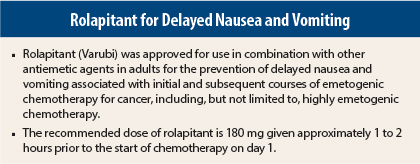In the Clinic provides overviews of novel oncology agents, addressing indications, mechanisms, administration recommendations, safety profiles, and other essential information needed for the appropriate clinical use of these drugs.
On September 2, 2015, rolapitant (Varubi) was approved for use in combination with other antiemetic agents in adults for the prevention of delayed nausea and vomiting associated with initial and subsequent courses of emetogenic chemotherapy for cancer, including, but not limited to, highly emetogenic chemotherapy. (See page 38 for news of FDA approval).
Supporting Efficacy Data
Approval was based on results of three double-blind phase III trials: two in patients receiving cisplatin-based highly emetogenic chemotherapy1,2 and one in patients receiving moderately emetogenic chemotherapy.1,3 These results showed that the addition of oral rolapitant to the 5-hydroxytryptamine 3 (5-HT3) antagonist granisetron and dexamethasone resulted in higher complete response rates (no emetic episodes and no rescue medication) in the delayed phase (25 to 120 hours) during cycle 1 of chemotherapy.
In one highly emetogenic chemotherapy trial, complete response rates during the delayed phase were 72.7% in the rolapitant group (n = 264) vs 58.4% in the control group (n = 262; difference = 14.3%, P < .001). In the second highly emetogenic chemotherapy trial, complete response rates were 70.1% in the rolapitant group (n = 271) vs 61.9% in the control group (n = 273; difference = 8.2%, P = .043). In the moderately emetogenic chemotherapy trial, in which approximately 50% of patients received anthracycline-cyclophosphamide combinations (now considered highly emetogenic), complete response rates were 71.3% in the rolapitant group (n = 666) vs 61.6% in the control group (n = 666; difference = 9.8%, P < .001).
How It Works
Rolapitant is a selective and competitive antagonist of human substance P/neurokinin-1 (NK1) receptors. It does not have significant affinity for NK2 or NK3 receptors or for a variety of other receptors, transporters, enzymes, and ion channels.
How It Is Given
The recommended dose of rolapitant is 180 mg given approximately 1 to 2 hours prior to the start of chemotherapy on day 1. It is given prior to the initiation of each chemotherapy cycle but at no less than 2-week intervals. It is administered in combination with dexamethasone and a 5-HT3 receptor antagonist. No dosage adjustment for dexamethasone is required.
Rolapitant is not an inhibitor or inducer of CYP3A4. Thus, no dose adjustments are needed for coadministration of the CYP3A4 substrate dexamethasone or other substrates such as midazolam and ondansetron. Strong CYP3A4 inducers (eg, rifampin) reduce plasma levels of rolapitant; use of rolapitant should be avoided in patients requiring chronic treatment with such drugs.
Rolapitant is a moderate CYP2D6 inhibitor. Caution is warranted in considering the concomitant use of CYP2D6 substrates with a narrow therapeutic index. Concomitant use increased exposure to dextromethorphan. Concomitant treatment with thioridazine is contraindicated. Concomitant use of pimozide should be avoided; if it cannot be avoided, patients should be monitored for QT prolongation.
Rolapitant is an inhibitor of the breast cancer resistance protein (BCRP) and an inhibitor of P-glycoprotein (P-gp). Increased exposure to BCRP substrates with a narrow therapeutic index (eg, methotrexate, topotecan, irinotecan) may result in potential adverse reactions, requiring monitoring if concomitant use cannot be avoided. The lowest dose of rosuvastatin (Crestor) should be given if concomitant use cannot be avoided. Increased exposure to P-gp substrates with a narrow therapeutic index, such as digoxin, may result in potential adverse reactions, requiring monitoring if concomitant use cannot be avoided.
No dosage adjustment is needed in patients with mild or moderate hepatic impairment. There are no data in patients with severe hepatic impairment; patients with severe hepatic impairment should be monitored for adverse reactions if use of rolapitant cannot be avoided.
Safety Profile
Overall, adverse events were reported in approximately 7% of rolapitant patients and 6% of control patients during cycle 1 of the phase III trials. The most common adverse events of any grade that occurred more frequently in rolapitant patients during cycle 1 in the highly emetogenic chemotherapy trials were neutropenia (9% vs 8% in control group), hiccups (5% vs 4%), and abdominal pain (3% vs 2%). The most common adverse events in the moderately emetogenic chemotherapy trial were decreased appetite (9% vs 7%), neutropenia (7% vs 6%), dizziness (6% vs 4%), dyspepsia (4% vs 2%), urinary tract infection (4% vs 3%), stomatitis (4% vs 2%), and anemia (3% vs 2%). Among 1,198 rolapitant recipients who continued in an optional multiple-cycle extension for up to 6 cycles of chemotherapy, adverse events were generally similar to those observed in cycle 1.
Rolapitant carries warnings/precautions for interaction with CYP2D6 substrates with a narrow therapeutic index. The inhibitory effect of a single dose of rolapitant on CYP2D6 persists for at least 7 days. Concurrent use of rolapitant with the CYP2D6 substrate thioridazine is contraindicated. ■
References
1. Varubi (rolapitant) tablets prescribing information, Tesaro, Inc, September 2015. Available at http://varubirx.com/. Accessed September 9, 2015.
2. Rapoport BL, Chasen MR, Gridelli C, et al: Safety and efficacy of rolapitant for prevention of chemotherapy-induced nausea and vomiting after administration of cisplatin-based highly emetogenic chemotherapy in patients with cancer: Two randomised, active-controlled, double-blind, phase 3 trials. Lancet Oncol. August 10, 2015 (early release online).
3. Schwartzberg LS, Modiano MR, Rapoport BL, et al: Safety and efficacy of rolapitant for prevention of chemotherapy-induced nausea and vomiting after administration of moderately emetogenic chemotherapy or anthracycline and cyclophosphamide regimens in patients with cancer. Lancet Oncol. August 10, 2015 (early release online).
Report Adverse Events
Health-care professionals should report all serious adverse events suspected to be associated with the use of any medicine or device to FDA’s MedWatch Reporting System by completing a form online at www.fda.gov/medwatch/report.htm, by faxing (800-FDA-0178), by mailing the postage-paid address form provided online, or by telephone (800-FDA-1088).


